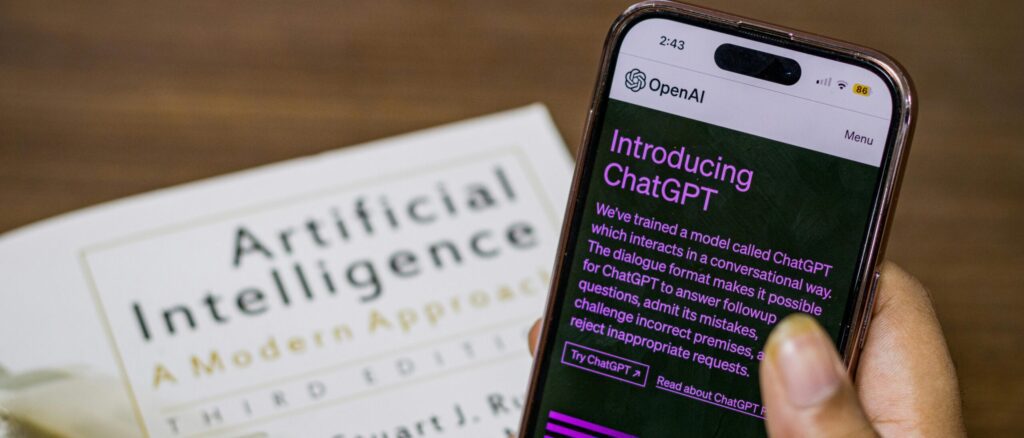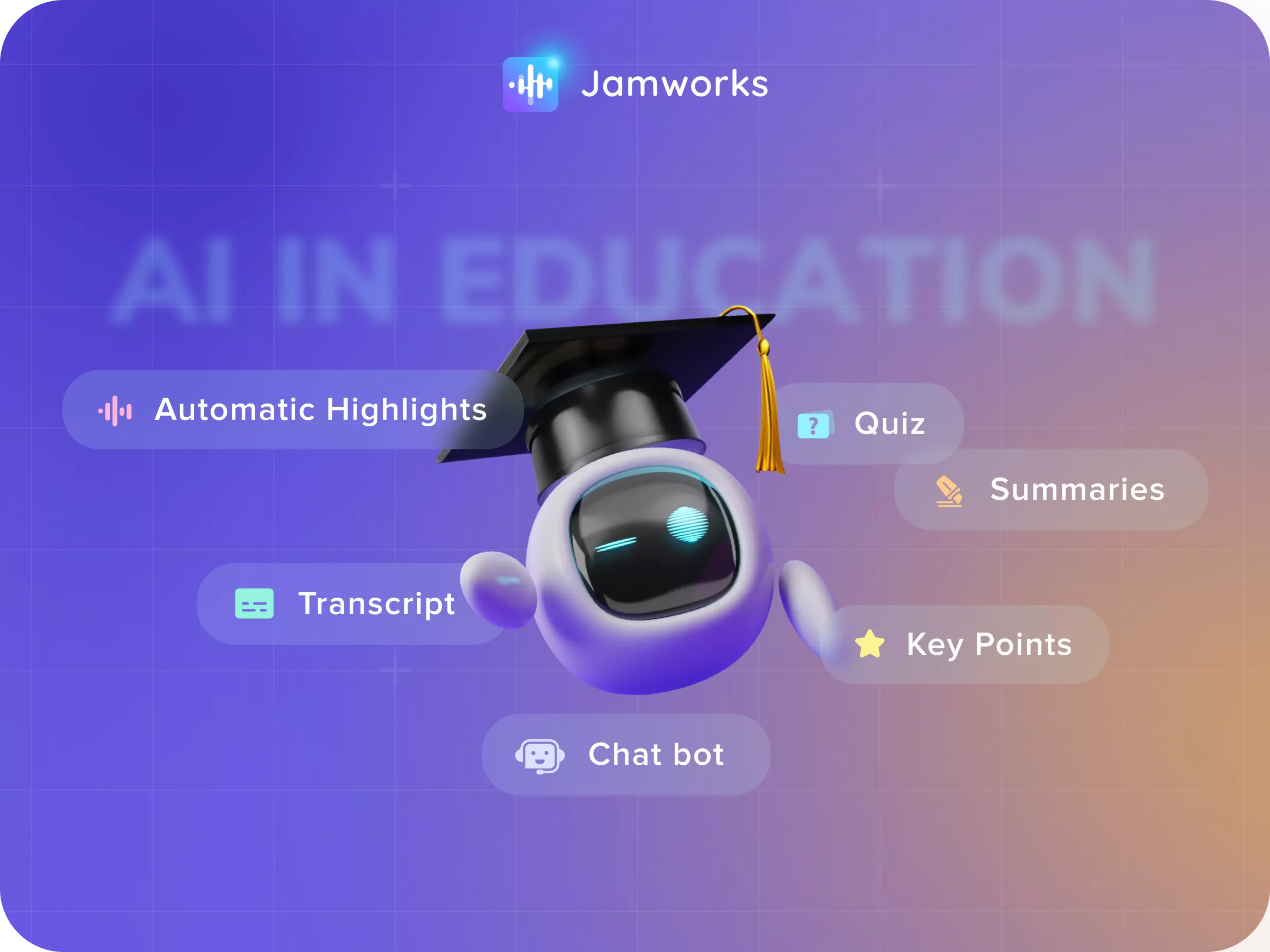AI adoption in higher education is transforming how students learn, offering both opportunities and challenges. According to a poll run by the Higher Education Policy Institute (HEPI), only 22% of students are satisfied with the AI support at their university, highlighting the need for improvement. But, how can universities empower students with AI-powered tools while maintaining academic integrity? In this blog, we’ll explore students’ use of AI for personalised and accessible learning, the importance of effective AI adoption for universities, and how Jamworks can help institutions deliver safe, AI-powered learning experiences.
Students’ views on AI adoption
By understanding how students perceive and use AI tools, we can gain insight into the advantages and challenges that need addressing. Jisc ran in-person student discussion forums to help us understand students’ perceptions of generative AI. This is what we’ve learned so far:
Collaborating with AI tutors
Students view AI as a collaborative tool, like a digital assistant or AI tutor, that can support active learning and critical thinking. 36% of students polled by the HEPI also reported using ‘AI tutors’ to explain concepts. Jisc found students use AI tools, like ChatGPT, to clarify complex concepts, break down information for better comprehension, and for guided learning. Similarly, a study found university students in Hong Kong also use AI as a virtual tutor.
These ‘AI tutors’ provide students with immediate feedback, allowing them to address gaps in their knowledge. Students highlighted that AI is responsive, even out of hours. They felt comfortable asking AI ongoing questions to aid their understanding but uncomfortable adopting this approach with peers or teachers. AI tools can help students feel less conscious about being seen as ‘stupid’ or not learning fast enough.
Accessible, flexible learning
Generative AI tools can make education more accessible for students with diverse needs. Jisc found some of these students felt unable to remain in study without AI tools. Students shared that they are paying for tools that meet their accessibility needs and allow them to access their education. This highlights that AI can break down key barriers for students who are neurodivergent, disabled, have a learning disability or difficulty, or have a mental health condition.
Students also reported using AI to tailor their study materials. They generated study materials like flashcards and multiple-choice questions (MCQs). This gives all students the power to have learning materials that address their needs, but also work on the gaps in their knowledge.
AI tools can create a more personalised, accessible learning experience for each student. In a Harvard study, AI tutors were shown to effectively support and engage students at all levels. This personalised approach allowed students to learn twice as much, improving their engagement and motivation.
Editing and AI-summarisation
Students use AI to refine their writing, including written communication like emails, for personal and academic purposes. But, what about AI-powered text generation? This has been a key concern for educators, as students could use AI to complete assessments unethically. However, 65% of students polled by HEPI believe AI-generated text could be spotted in their work.
Instead, students appear to be using AI as a collaborative editing tool. Jisc found that students use AI to improve the tone, style, clarity, or structure of texts. According to the HEPI poll, 37% of students also use AI-assisted tools, like Grammarly, to edit their text. Many use AI to summarise lengthy texts, like their notes or readings, to make learning more efficient.
Why AI adoption in higher education matters

From the research so far, it’s clear that students are keen to use AI and currently use these tools to enhance their learning. Their usage of AI tools appears to be unrelated to completing assessments, with policies mostly deterring students from submitting AI-generated text.
However, there are still challenges to address. AI models can be unreliable and biased, which makes critical and mindful use important. Jisc found students want guidance from their institutions on effective and ethical AI use. Students believe AI skills are important for their future careers and want to be well-equipped. They expressed wanting a safe, inclusive, and responsive education on AI.
Ensuring academic integrity
Only 22% of students are satisfied with the AI support at university, according to the HEPI. Jisc also found that students felt AI guidance was lacking, ambiguous, and applied inconsistently. Students are concerned about AI reliability, just like educators. However, students share they are not confident in their ability to critically evaluate outputs from AI tools.
They lack the information literacy skills to assess the accuracy of the information, including its sources. 35% of students polled by HEPI were unaware of how often AI produces hallucinated or made-up information. Students want clear, unambiguous guidelines for AI use in learning and assessments. They want policies to be fair to all, and for universities to recommend AI tools that align with these rules.
Meeting accessibility needs
According to Jisc, students are paying for AI tools that meet their accessibility needs. This highlights the importance of effective AI adoption for accessible learning. For some students, AI tools can break down key barriers to education. Students expressed wanting a fair, universal approach to AI that considers diverse needs.
Students may face challenges with note taking, reading comprehension, and different styles of thinking, communication, or learning. AI tools make it easier for students to overcome their unique barriers to learning. They can access support whenever they need it, and learn at their own pace.
Preventing a digital divide
The HEPI found a potential digital divide emerging among students, with those from more privileged backgrounds more likely to use AI. This gap could widen further for students who lack access to AI tools or confidence in using them effectively.
While basic AI tools are free, Jisc found students pay for tools like Notion and ChatGPT Plus. They are more willing to pay for AI tools that are career-focused or support accessibility and neurodiversity. If some students can’t afford such tools, this creates a growing gap, especially in terms of accessibility.
Institutions can navigate this divide and ensure academic integrity by providing equitable access to AI tools that support learning. Students recognise that AI skills are important for not only their education but also their future careers. AI is becoming increasingly integrated into everyday tools, like Microsoft and Google products. Education can empower students to understand and work through this technological shift.
Navigate AI adoption in education with Jamworks

Research by Jisc and the HEPI highlights that students want more AI tools from their institutions. However, only 9% of students polled by the HEPI said their institution currently does this. Jisc found students were interested in a suite of AI tools approved by their institution, especially those that meet learners’ unique needs. 30% of students agree their institution should provide AI tools, according to the HEPI.
Understandably, effective AI adoption requires a significant amount of time, resources, and research for institutions. That’s why Jamworks helps universities bridge the gap by offering students a safe, accessible, and AI-powered learning experience. Jamworks works directly with recorded lecture content, ensuring that educators’ guidance is at the core of the student’s learning process.
AI tutor for personalised learning
Students can access personalised learning support from JamAI, an AI-powered tutor chatbot. Unlike popular AI chatbots, JamAI is safeguarded and works with the students’ recorded lecture content. JamAI can answer questions, explain concepts, produce summaries, and much more. This core feature aligns with how students are currently using AI tools but ensures they are learning from reliable sources of information. Students can use JamAI to learn at their own pace, develop their knowledge, and ask questions, even if they feel anxious or self-conscious.
Automated AI-powered note taking
Jamworks aims to empower students with automated note taking. Students can face challenges with note taking, making it hard for them to be present and stay focused. Jamworks records lectures and breaks down the content into topics using Automatic Highlights. Students can review each topic as a written transcript extract or audio snippet. Jamworks also generates AI-powered summaries, known as Key Points, to help students easily review their notes. This automated, structured note taking process helps students overcome barriers to note taking. Note taking support can be essential for students who are neurodivergent, disabled, have learning disability or difficulty, or a mental health condition.
Customised study materials
Students can save time with AI-generated learning materials. Jamworks turns lecture content into AI flashcards, making it easy for students to test their knowledge in a quiz format. Flashcards are linked to the original lecture recording, keeping everything organised, unlike traditional flashcards. Jamworks supports students in all aspects of learning to help them capture, organise, understand, and memorise lecture content.
AI-enhanced accessible learning
Jamworks is an assistive technology software, designed with key accessibility features. Students can access live captioning, adjust text size, fonts, and colours, and use keyboard navigation. Jamworks is screen-reader compatible and offers pre-built profiles for specific needs, such as a seizure-safe profile and a vision-impaired profile. These are just a few of the additional accessibility features that make it easier for all students to access AI-powered learning. Jamworks empowers students with safe, AI features while also making sure their software is accessible to all students.
Please feel free to book a call to learn more about how Jamworks can help institutions support students with AI enhanced learning. We’d be happy to set up a free trial for a semester so you can gauge the benefits for yourself.
Click here to arrange a personal demonstration.